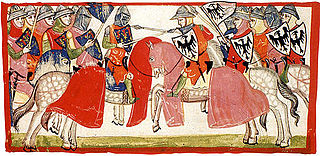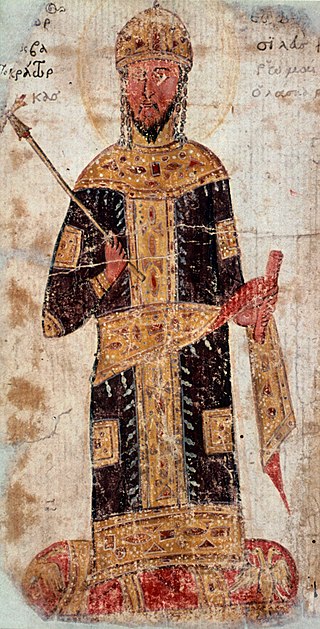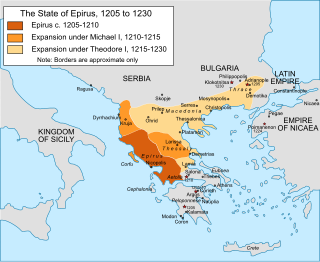Related Research Articles

Year 1266 (MCCLXVI) was a common year starting on Friday of the Julian calendar.

Theodore II Doukas Laskaris or Ducas Lascaris was Emperor of Nicaea from 1254 to 1258. He was the only child of Emperor John III Doukas Vatatzes and Empress Irene Laskarina. His mother was the eldest daughter of Theodore I Laskaris, who had established the Empire of Nicaea as a successor state to the Byzantine Empire in Asia Minor after the crusaders captured the Byzantine capital, Constantinople, during the Fourth Crusade in 1204. Theodore received an excellent education from two renowned scholars, Nikephoros Blemmydes and George Akropolites. He made friends with young intellectuals, especially with a page of low birth, George Mouzalon. Theodore began to write treatises on theological, historical and philosophical themes in his youth.

The Despotate of Epirus was one of the Greek successor states of the Byzantine Empire established in the aftermath of the Fourth Crusade in 1204 by a branch of the Angelos dynasty. It claimed to be the legitimate successor of the Byzantine Empire, along with the Empire of Nicaea and the Empire of Trebizond, its rulers briefly proclaiming themselves as Emperors in 1227–1242. The term "Despotate of Epirus" is, like "Byzantine Empire" itself, a modern historiographic convention and not a name in use at the time.
The Battle of Pelagonia or Battle of Kastoria took place in early summer or autumn 1259, between the Empire of Nicaea and an anti-Nicaean alliance comprising Despotate of Epirus, Kingdom of Sicily and the Principality of Achaea. It was a decisive event in the history of the Eastern Mediterranean, ensuring the eventual reconquest of Constantinople and the end of the Latin Empire in 1261.

The Kingdom of Albania was established by Charles of Anjou in the Albanian territories he conquered from the Byzantine Empire in 1271, with the help of the local Albanian nobility. The Kingdom of Albania was declared in late February 1272. The kingdom extended from the region of Durazzo south along the coast to Butrint. A major attempt to advance further in direction of Constantinople failed at the Siege of Berat (1280–1281). A Byzantine counteroffensive soon ensued, which drove the Angevins out of the interior by 1281. The Sicilian Vespers further weakened the position of Charles, and the Kingdom was soon reduced by the Byzantines to a small area around Durazzo. The Angevins held out here, however, until 1368, when the city was captured by Karl Thopia. In 1392, Karl Thopia's son surrendered the city to the Republic of Venice.

Michael I Komnenos Doukas, Latinized as Comnenus Ducas, and in modern sources often recorded as Michael I Angelos, a name he never used, was the founder and first ruler of the Despotate of Epirus from c. 1205 until his assassination in 1214/15.

Theodore Komnenos Doukas was the ruler of Epirus and Thessaly from 1215 to 1230 and of Thessalonica and most of Macedonia and western Thrace from 1224 to 1230. He was also the power behind the rule of his sons John and Demetrios over Thessalonica in 1237–1246.

Michael II Komnenos Doukas, Latinized as Comnenus Ducas, often called Michael Angelos in narrative sources, was from 1230 until his death in 1266/68 the ruler of the Despotate of Epirus, which included Epirus in northwestern Greece, the western part of Greek Macedonia and Thessaly, and western Greece as far south as Nafpaktos.
Golem was a Albanian nobleman who ruled the Principality of Arbanon, in its phase of semi-independency. He was the last ruler of Arbanon before its final annexation in the reemerging Byzantine Empire. His holdings included Krujë and probably Ohrid.

Pjetër Losha was an Albanian clan leader in medieval Epirus. He belonged to the Losha fis and was the leader of a combined force of his own clan and the fis of Mazaraki and Malakasi. In 1360, he became Despot of Arta, Rogoi and the area of Amphilochia. He died in 1374 and was succeeded by his close ally, Gjin Bua Shpata. The Chronicle of the Tocco is an important primary source for his life and the Albanians in medieval Epirus in general.

Borsh Castle also known as Sopot Castle from the hill it is located, is a ruined castle near the village Borsh, Albania, near the coast of the Ionian Sea. Inside the castle is the 17th-century Hajji Bendo Mosque from Ottoman times.

The Muzaka were a noble family that ruled over the region of Myzeqe in the Late Middle Ages. The Muzaka are also referred to by some authors as a tribe or a clan. The earliest historical document that mentions the Muzaka family is written by the Byzantine historian Anna Komnene. At the end of the 13th and beginning of the 14th century members of the Muzaka family controlled a region between the rivers of Devoll and Vjosë. Some of them were loyal to the Byzantine Empire while some of them allied with Charles of Anjou who gave them impressive Byzantine-like titles in order to subdue them more easily. During a short period, Serbian Emperor Stefan Dušan occupied Albania including domains of Muzaka family but after Dušan's death they regained their former possessions. After the Battle of Savra in 1385 the territory of Albania came under the Ottoman Empire; they served the Ottomans until 1444 when Theodor Corona Musachi joined Skanderbeg's rebellion. When the Ottomans suppressed Skanderbeg's rebellion and captured the territory of Venetian Albania in the 15th century many members of the Muzaka family retreated to Italy. Those who stayed in Ottoman Albania lost their feudal rights, some converted to Islam and achieved high ranks in the Ottoman military and administrative hierarchy.

The siege of Berat in Albania by the forces of the Angevin Kingdom of Sicily against the Byzantine garrison of the city took place in 1280–1281. Berat was a strategically important fortress, whose possession would allow the Angevins access to the heartlands of the Byzantine Empire. A Byzantine relief force arrived in spring 1281, and managed to ambush and capture the Angevin commander, Hugo de Sully. Thereupon, the Angevin army panicked and fled, suffering heavy losses in killed and wounded as it was attacked by the Byzantines. This defeat ended the threat of a land invasion of the Byzantine Empire, and along with the Sicilian Vespers marked the end of the Western threat to reconquer Byzantium.
John Doukas was a member of the Doukas family, a relative of Byzantine emperor Alexios I Komnenos and a senior military figure of his reign. As governor of Dyrrhachium, he secured the imperial possessions in the western Balkans against the Serbs. Appointed megas doux, he scoured the Aegean of the fleets of the Turkish emir Tzachas, suppressed rebellions in Crete and Cyprus, and then recovered much of the western coast of Anatolia for Byzantium.

The Battle of Apamea was fought on 19 July 998 between the forces of the Byzantine Empire and the Fatimid Caliphate. The battle was part of a series of military confrontations between the two powers over control of northern Syria and the Hamdanid emirate of Aleppo, which in turn were part of the larger series of regional conflicts known as the Arab–Byzantine wars. The Byzantine regional commander, Damian Dalassenos, had been besieging Apamea, until the arrival of the Fatimid relief army from Damascus, under Jaysh ibn Samsama. In the subsequent battle, the Byzantines were initially victorious, but a lone Kurdish rider managed to kill Dalassenos, throwing the Byzantine army into panic. The fleeing Byzantines were then pursued, with much loss of life, by the Fatimid troops. This defeat forced the Byzantine emperor Basil II to personally campaign in the region the next year, and was followed in 1001 by the conclusion of a ten-year truce between the two states.
Gazo Chinard (1230–1294) was a French noble lord, brother or son of Philippe Chinard and vassal of Manfred of Sicily and Charles of Anjou. After the assassination of Philippe Chinard by Michael II of Epirus, Gazo enraged by the act, handed over the territories to Charles of Anjou, who in return appointed him as captain general of Corfu.

The Matranga family was an Albanian noble family during 13th and 15th centuries. Members of this family include local rulers, Byzantine officials and writers. After the occupation of Albania by the Ottoman Empire, part of the family emigrated to Italy and settled in the Arbëresh villages of Piana degli Albanesi and Santa Cristina Gela in Southern Italy, where they have continued to maintain the Arbëresh language.

The Empire of Thessalonica is a historiographic term used by some modern scholars to refer to the short-lived Byzantine Greek state centred on the city of Thessalonica between 1224 and 1246 and ruled by the Komnenodoukas dynasty of Epirus. At the time of its establishment, the Empire of Thessalonica, under the capable Theodore Komnenos Doukas, rivaled the Empire of Nicaea and the Second Bulgarian Empire as the strongest state in the region, and aspired to capturing Constantinople, putting an end to the Latin Empire, and restoring the Byzantine Empire that had been extinguished in 1204.

The Revue des études byzantines is an annual peer-reviewed academic journal covering the study of Greek Christianity and especially Byzantine civilization. It was established in 1897 as Échos d'Orient, renamed Études byzantines in, and obtaining its current title in 1946. The journal is published by Peeters on behalf of the Institut français d'études byzantines (Paris) and the editor-in-chief is Olivier Delouis.
Philippe Malaurie was a French professor of private law.
References
- ↑ Anamali, Skënder; Prifti (2002) (in Albanian). Historia e popullit shqiptar në katër vëllime. Botimet Toena. ISBN 99927-1-622-3 p. 205-206
- ↑ Revue des études byzantines, Volumes 61-62 Author Institut français des études byzantines Publisher Institut français d'études byzantines., 2003 p.232